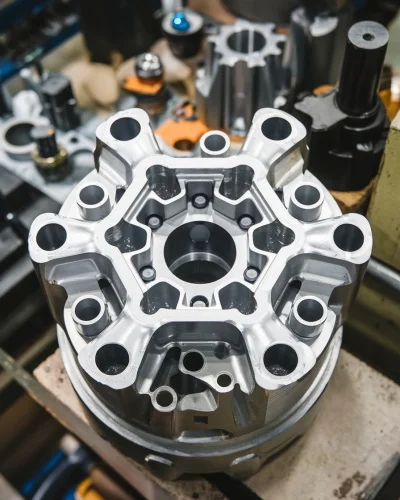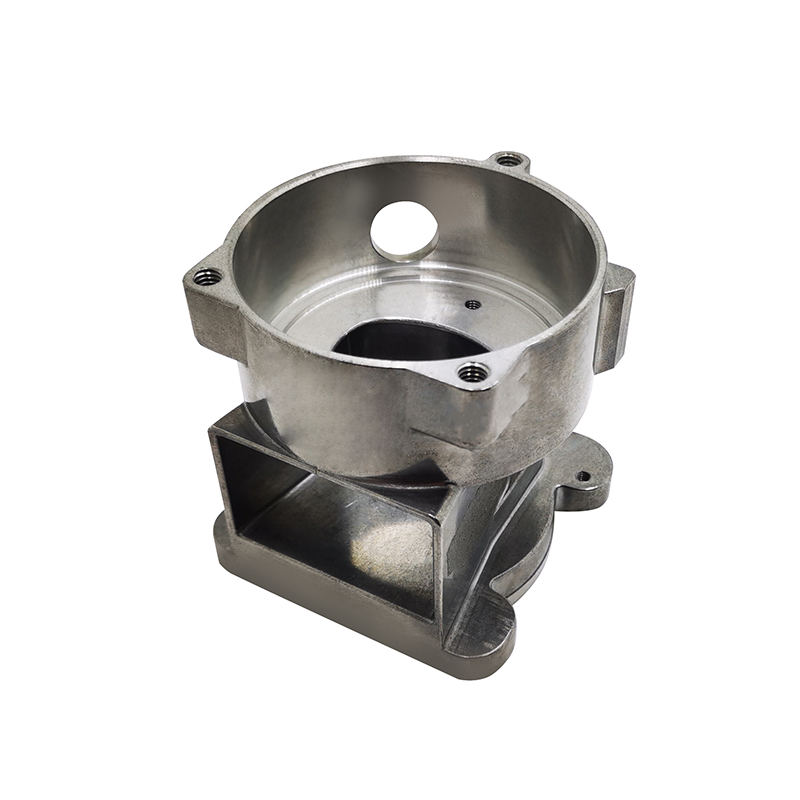The value of aluminum casting in creating lightweight metal parts
The Future of Light Weight Aluminum Foundries: Trends and Developments Shaping the Market
The light weight aluminum shop industry is undertaking significant transformation. Secret fads highlight the value of sustainability and effectiveness. Innovations in wise manufacturing and automation are becoming widespread. Shops are progressively concentrated on making use of recycled products. This change increases inquiries regarding future techniques and technologies. Exactly how will these modifications influence manufacturing approaches and market dynamics? The solutions might redefine the market landscape in unanticipated means.
Innovations in Smart Production Technologies
As the light weight aluminum shop sector advances, developments in smart manufacturing innovations are ending up being significantly essential for improving efficiency and performance. The combination of automation, expert system, and the Web of Points (IoT) is transforming conventional foundry procedures. These technologies allow real-time surveillance of processes, permitting for immediate modifications that optimize output and lower waste.
Equipment knowing formulas examine manufacturing data to identify patterns and anticipate maintenance needs, lessening downtime. Robotics are increasingly utilized for recurring jobs, freeing competent workers to focus on more complex difficulties. Additionally, electronic twins-- digital designs of physical processes-- promote simulations that can improve style and operational methods.
The adoption of these smart production technologies is driving affordable advantages in the light weight aluminum foundry market. By streamlining process and boosting decision-making capacities, foundries can satisfy growing market demands while keeping premium criteria. The future of aluminum shops is undeniably connected to these technical technologies.
Welcoming Eco-Friendly Materials and Processes
The aluminum foundry sector is significantly focusing on eco-friendly materials and processes to improve sustainability. This shift consists of the adoption of lasting product sourcing, energy-efficient production methods, and reliable recycling and waste management techniques. By incorporating these methods, factories intend to decrease their environmental effect while preserving competition in the marketplace.
Sustainable Material Sourcing
Just how can light weight aluminum factories boost their sustainability initiatives? Sustainable material sourcing has emerged as an essential approach in attaining this goal. By prioritizing recycled light weight aluminum, foundries can significantly lower their ecological footprint, as recycled materials need less energy and less resources compared to main aluminum production. In enhancement, sourcing products from licensed providers who stick to green techniques advertises accountable mining and minimizes eco-friendly effect. Foundries are additionally discovering different products, such as biopolymers and environment-friendly layers, to match traditional light weight aluminum processes. Working together with stakeholders, consisting of distributors and ecological organizations, fosters innovation in sourcing strategies. Eventually, accepting lasting product sourcing not just straightens with international sustainability goals yet additionally placements light weight aluminum foundries as leaders in environmentally accountable manufacturing.
Energy-Efficient Production Techniques
Aluminum shops are progressively embracing energy-efficient manufacturing strategies to match their sustainable material sourcing efforts. These methods concentrate on decreasing power usage throughout the production procedure. Advanced technologies, such as induction melting and enhanced casting procedures, are being implemented to reduce the total carbon footprint. Additionally, automation and wise production systems enhance functional performance, permitting better energy administration. Factories are likewise exploring the integration of renewable resource resources, such as solar and wind, to power their operations. By focusing on energy efficiency, light weight aluminum foundries not just lower manufacturing prices however likewise straighten themselves with international sustainability objectives, guaranteeing a much more environmentally accountable approach to light weight aluminum manufacturing while meeting the increasing need for environmentally friendly techniques in the market.
Recycling and Waste Monitoring
Accepting environmentally friendly materials and processes, light weight aluminum foundries are focusing on recycling and waste management methods to improve sustainability in their operations. By integrating closed-loop systems, these facilities are lessening waste and maximizing source effectiveness. Scrap light weight aluminum, a conveniently offered product, is being recycled on-site, greatly decreasing the need for virgin materials and reducing energy consumption. Advancements in sorting and refining innovations additionally facilitate the recycling of light weight aluminum, ensuring that also polluted products can be repurposed efficiently. In addition, foundries are adopting lasting techniques such as minimizing contaminated materials and promoting the usage of naturally degradable products for packaging. This dedication to reusing not only reduces environmental influence yet likewise improves the financial viability of light weight aluminum foundries in an open market.
The Duty of Automation and Robotics
Automation and robotics are increasingly transforming the light weight aluminum shop market, significantly enhancing production effectiveness. By integrating sophisticated technologies, foundries can lower labor costs while at the same time boosting safety and security requirements for their workforce. This change not only improves procedures but also positions the industry for sustainable development in an open market.
Improved Production Efficiency
Reinventing manufacturing procedures, the combination of sophisticated robotics and automation technologies has actually become a foundation for light weight aluminum shops looking for boosted efficiency. These technologies improve process, decrease cycle times, and improve product high quality by minimizing human mistake. Automated systems can monitor assembly line in real-time, enabling immediate modifications that enhance outcome. Additionally, robotics promote the handling of unsafe materials, making sure much safer workplace while raising throughput. Anticipating maintenance modern technologies also contribute to effectiveness by expecting tools failings, consequently lowering downtime. Consequently, aluminum foundries can achieve greater consistency in their items while reacting more swiftly to market demands. This accept of automation is establishing a brand-new criterion for productivity and functional quality within the industry.

Lowering Labor Prices
The change towards progressed robotics and automation in aluminum factories not just enhances manufacturing efficiency yet also plays a substantial role in minimizing labor costs. By integrating automated systems, factories can decrease the reliance on manual labor, which typically includes high earnings and training expenses. Robotics simplify recurring tasks such as putting, molding, and ending up, allowing for a greater outcome with fewer personnel. This technological modification not only decreases labor-related costs but also improves consistency and quality in manufacturing. Automation can operate around the clock, maximizing operational hours without the associated prices of overtime or change differentials. Therefore, aluminum factories can accomplish considerable financial savings while maintaining affordable rates in an evolving market landscape.
Improving Safety Specifications
While conventional light weight aluminum factory operations typically subject employees to harmful atmospheres, the combination of robotics and automation substantially enhances safety and security criteria within the market. Automated systems can carry out risky tasks, such as liquified metal handling and hefty training, lowering human direct exposure to harmful problems. In addition, robotics can operate in harmful atmospheres and extreme temperatures, effectively decreasing the danger of injury. Advanced checking technologies and man-made knowledge guarantee real-time safety and security analyses, permitting for prompt feedbacks to potential hazards. Additionally, automation streamlines workflows, reducing the probability of mishaps triggered by human mistake. Therefore, the fostering of these technologies not only improves safety however also fosters an helpful site extra efficient and efficient workplace in aluminum foundries.
Enhancing Power Performance in Production
As aluminum foundries look for to keep competitiveness in an advancing market, enhancing energy performance in production has actually arised as a vital emphasis. By taking on sophisticated technologies such as high-efficiency melting heating systems and automated temperature level controls, shops can especially minimize energy consumption. Implementing real-time monitoring systems permits specific monitoring of power usage throughout the manufacturing process, enabling fast changes to enhance efficiency.
Furthermore, changing to alternative energy resources, including renewable alternatives, can even more reduce the carbon impact. The assimilation of energy recovery systems, which reclaim waste warm for reuse, is coming to be significantly usual. Educating personnel in energy management practices assures that every person included in the manufacturing process is conscious of energy usage.
These campaigns not just lower operational prices yet also line up with worldwide sustainability objectives, positioning light weight aluminum foundries as responsible gamers in the industry while enhancing their overall competitiveness. - Precision aluminum casting
Innovations in Recycling Aluminum
Technologies in recycling light weight aluminum have acquired energy alongside efforts to enhance energy efficiency in production. The light weight aluminum sector has embraced advanced modern technologies that improve the reusing procedure, minimizing energy usage and ecological effect. Methods such as hydrometallurgy and new sorting innovations improve the removal of light weight aluminum from scrap, enhancing return prices and ensuring better recycled product.
The advancement of closed-loop recycling systems allows shops to basics recycle light weight aluminum without substantial degradation in top quality, making the process a lot more lasting. Innovations in logistics and collection, including improved radar and automated sorting, have actually likewise played a vital function in raising the effectiveness of light weight aluminum healing. These improvements not only add to a circular economic situation but additionally help minimize the carbon footprint connected with aluminum production. As the need for lasting techniques grows, these innovations place the light weight aluminum factory sector as a leader in accountable resource administration.
Reacting to Market Demands and Customer Trends
Adaptability has ended up being a keystone for aluminum foundries reacting to developing market demands and consumer trends. As industries increasingly prioritize sustainability, light weight aluminum foundries are changing towards eco-friendly methods, consisting of improved recycling processes and reduced carbon footprints. This change aligns with consumer preferences for eco responsible products, driving foundries to innovate their offerings.
Additionally, the rise of lightweight materials in vehicle and aerospace fields requires advancements in light weight aluminum alloys and casting techniques. Shops are purchasing r & d to produce high-strength, light-weight components that meet rigid efficiency requirements.
Additionally, personalization has acquired traction, with customers seeking tailored options. Aluminum factories are leveraging innovative production modern technologies, such as 3D printing, to suit specific customer needs successfully. This responsiveness not additional reading just pleases customer demands however also positions light weight aluminum foundries competitively in a vibrant market landscape, guaranteeing their relevance in an ever-changing industrial setting.

Regularly Asked Concerns
Just How Do Aluminum Foundries Influence Resident Economies?
Light weight aluminum factories substantially impact neighborhood economic situations by producing tasks, stimulating demand for regional distributors, and adding to area growth. Their operations frequently result in raised tax obligation incomes, which can fund crucial civil services and framework enhancements.
What Are the Safety And Security Regulations for Light Weight Aluminum Foundry Employees?
Safety and security laws for light weight aluminum factory employees include obligatory personal protective tools, proper air flow systems, regular training on unsafe materials, and adherence to guidelines set by occupational health and wellness administrations to minimize threats and warranty worker safety. - aluminum casting
Just How Does Light Weight Aluminum Recycling Affect Global Supply Chains?
Light weight aluminum recycling substantially minimizes demand for raw products, enhances resource efficiency, and stabilizes prices. This shift influences worldwide supply chains by cultivating a round economy, promoting sustainability, and making certain an extra resilient industry in varying markets.
What Occupation Opportunities Exist in the Light Weight Aluminum Foundry Market?
Numerous profession possibilities exist in the aluminum factory industry, consisting of functions in design, top quality control, manufacturing monitoring, and r & d. Experienced labor settings such as mold makers and equipment operators are likewise sought after.
How Do International Profession Plans Influence Light Weight Aluminum Foundries?
International profession policies considerably influence light weight aluminum factories by affecting import tolls, supply chain characteristics, and market access. These variables can influence functional expenses, competition, and general success within the global aluminum manufacturing landscape.
By focusing on recycled aluminum, shops can substantially minimize their ecological footprint, as recycled materials call for much less power and less sources compared to key light weight aluminum production. Light weight aluminum foundries are progressively taking on energy-efficient production methods to enhance their lasting material sourcing initiatives. Automation and robotics are significantly changing the light weight aluminum factory market, substantially improving manufacturing performance. The change towards progressed robotics and automation in light weight aluminum foundries not just enhances manufacturing effectiveness however likewise plays a considerable function in decreasing labor expenses. As aluminum foundries seek to maintain competition in a progressing market, enhancing power performance in manufacturing has actually arised as a critical focus.